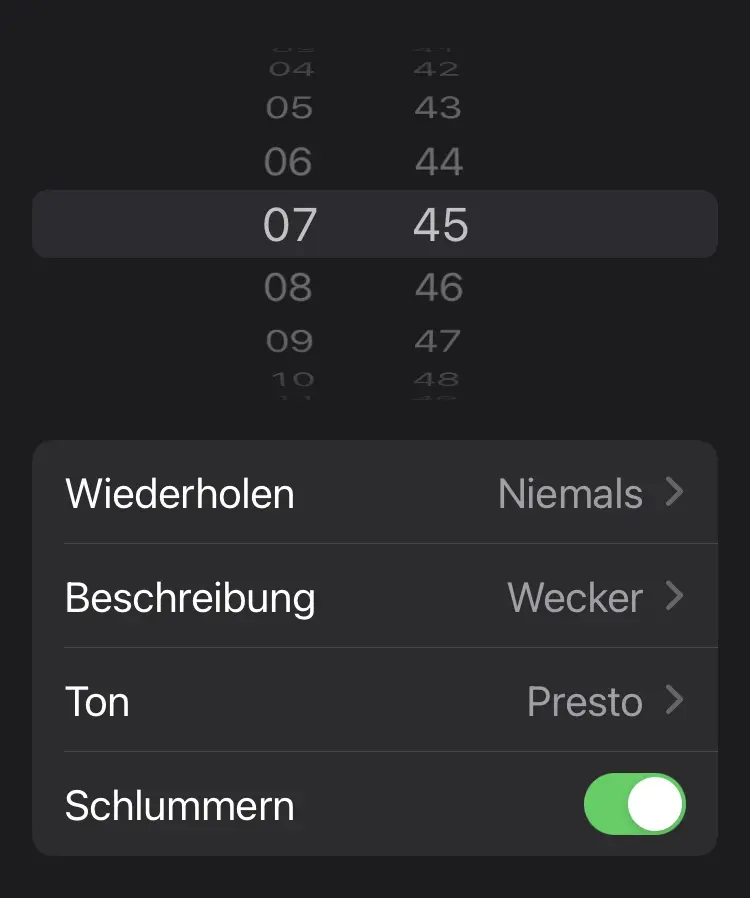Ist die Snoozetaste am Wecker jetzt schädlich oder nicht? oder ... wenn der Wecker dreimal…
Is the snooze button on the alarm clock harmful or not?
or … when the alarm clock wakes you up three times!
That is actually the rule. It feels like there are just as many counter-studies to most studies. This is currently also the case with the snooze button and its effect.
While last year there was a study [1]https://academic.oup.com/sleep/article/45/10/zsac184/6661272? that provided evidence that the snooze button has negative effects on people (more sleep disturbances, higher resting heart rate, less concentration etc.), a current study [2]https://onlinelibrary.wiley.com/doi/10.1111/jsr.14054 now says “it’s all garbage”, snoozing can even be helpful. Snoozing only cost the participants a total of six minutes of their overall sleep. In addition, most of the test subjects woke up from the light sleep phase, and the snoozers were also said to be mentally fitter.
What now?
Will everyone now pick and choose what soothes their conscience? This confusion of studies is not conducive to achieving a goal; it tends to lead to people listening less and less to studies and viewing them in the same way as statistics (I only believe the ones that I have falsified myself). It is important to look at the study design in order to be able to identify a certain relevance. For the most part, the media themselves do not compare anything here; they treat a mini-study in the same way as a long-term or meta-study.
What strikes me in the current “Pro Snoozer Button” study is
- that the test subjects were only observed for 2 days (plus one acclimatization night)
- the test group consisted of laboratory-internal test subjects (i.e. not a representative group) and notorious habitual snoozers (i.e. the body has undergone a longer conditioning phase in terms of “snoozing”)
- a comparison group of non-snoozers is missing

The 31 participants kept their usual sleeping time on both days, but slept through the whole night once and were woken up at their usual last wake-up time with an alarm clock, or were woken up by their alarm clock 30 minutes before their usual wake-up time on the other night, whereby they had to press the snooze function of their alarm clock three times every 9-10 minutes. The total sleep time remained the same compared to their everyday situation.
The same applies to a long-term effect of the snooze button on the body. This is because the waking process itself puts the body in an alarm state that is similar to an attack. In less than a second of shock, adrenaline rushes through the body and makes it more reactive. The heart, lungs, muscles and other organs are then on alert. But … an alarm situation (without need) is not healthy in itself if it happens every day, but it is even unhealthier if it happens several times a day in a row.
In my opinion, the extremely short observation period of only one day per intervention is therefore not meaningful enough to be able to draw a valid conclusion at various levels.
My personal conclusion
In my view, the studies that speak against snoozing are much more well-founded. Last year’s study had more than ten times the group size with almost 450 participants, a much longer observation period with a study duration of one year and, last but not least, the presence of a comparison group of non-snoozers for real comparability.
I am currently noticing that more and more studies are being published that have a more or less meaningful study setting. I cannot say exactly what the background to this development is. But the media don’t care much about that. They are increasingly chasing the texts through the AI without questioning them even once.
So for me the conclusion is clear: the snooze button is still a definite no-go in my eyes.
My tip
Use a light alarm clock to prevent you from being woken from a deep sleep phase. It prevents the “alarm mode” and lets you wake up gently. The slow rise of a gentle alarm tone or wake-up music can also have a similar effect. Both also have the positive side effect that the brain resists waking up less. Try it out and send me your feedback.
Referenzen[+]
Zum Thema passende Beiträge
- 3x Snoozetaste am Wecker - schädlich oder nicht?
